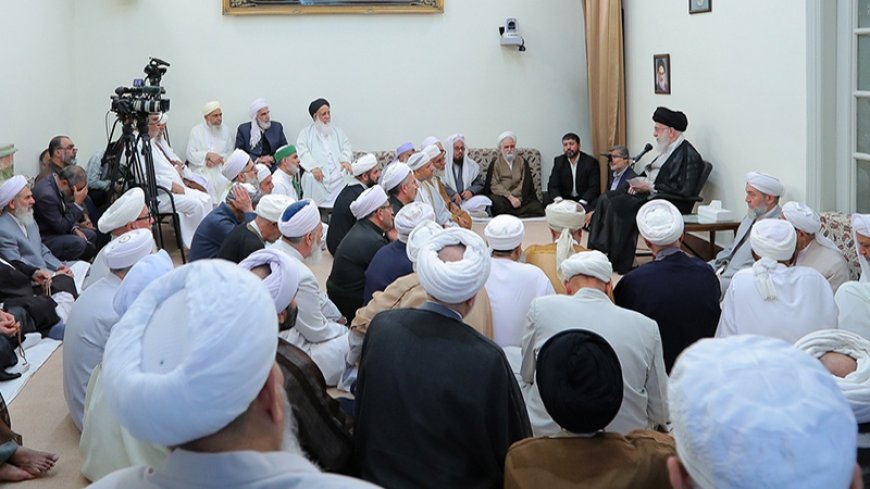3,000 Sunni Scholars Express Thanks to Iran's Supreme Leader for "True Promise II" Operation Against Israel: A Political Manoeuvre or Religious Solidarity?
Three thousand Sunni academics in Iran have penned a letter of thanks to Ayatollah Sayyid Ali Khamenei, the Supreme Leader of the Islamic Revolution, in an amazing display of solidarity.

Three thousand Sunni academics in Iran have penned a letter of thanks to Ayatollah Sayyid Ali Khamenei, the Supreme Leader of the Islamic Revolution, in an amazing display of solidarity. This letter responds to the recent "True Promise II" operation, an Iranian military effort ascribed with hitting far into Israeli territory. According to Iran's official news agency (IRNA), the letter honours Khamenei's leadership and hails his direction as crucial in disciplizing the "Zionist government" and raising the spirits of Palestinians and justice-loving people all around.
Given that the academics who wrote this come from Iran's Sunni minority, who are typically viewed as apart from the majority Shia theocracy, at first look this letter seems unexpected. But this action highlights a more general geopolitical and ideological convergence inside Iran's borders, where lines between sects melt in view of a shared enemy: Israel. Emphasising their positions as preachers and imams, the signatories present this alignment as not only political but also based on Islamic unity.
There is great timing to this letter. It chronicles Iran's retaliatory shelling of Israeli territory, which followed protracted "self-restrain," as the letter notes. Iran's Islamic Revolutionary Guard Corps (IRGC) has positioned itself as a defender of Palestinian interests appealing to Muslims worldwide as Israeli-Palestinian conflict rises and Israel keeps its military operations in Gaza ongoing. Emphasising the "joy" and "justice" allegedly resulting from the operation, the letter frames the Iranian attacks as an act of justifiable defence and vengeance for the continuing suffering of Palestinians.
For the Iranian regime, the support of Sunni academics fulfils two functions. It not only highlights Iran's larger importance inside the Muslim world but also improves domestic solidarity among its religious communities. This statement of support from Sunni religious leaders for military action by a Shia-dominated government emphasises the possibility of pan-Islamic causes to transcend internal sectarian barriers when confronting a common enemy—Israel.
Weaponising Sectarian Unity:
Although historical conflicts between Sunnis and Shias have propelled Middle Eastern tensions, Iran has long positioned itself as the leader of the so-called "Resistance Axis" against Israel, appealing to both Sunni and Shia Muslims. The support of 3,000 Sunni academics shows an effective approach of uniting several Islamic factions behind the anti-Zionism flag.
This serves more than only symbolism. By co-opting Sunni voices inside its borders to justify Iran's activities, the Iranian government is deliberately moving to create more Muslim unity around the Palestinian cause. This story is enhanced by the letter's clear denunciation of Israel's "mass killing" of Palestinian youngsters, effectively positioning Iran as the protector of Muslims everywhere—regardless of sect—against a shared oppressor.
wider consequences
Geopolitical aspirations of Iran in the Middle East are barely secret. Tehran has progressively positioned itself as a strong enemy of Israel by use of proxies like Hezbollah in Lebanon and support of Palestinian militant groups. The Iranian government positions itself as the front-runner of anti-Israel resistance by pushing Sunni academics to openly support military actions, therefore strengthening their position both locally and in the greater Muslim world.
Still, this oneness carries hazards. Although anti-Israel feeling is a gathering place for many Muslims, Iran's interventionist tactics have also caused problems with Sunni-majority nations, particularly in the Gulf, where Iran is usually seen with mistrust. Although the letter is important, it is yet unclear whether Sunni religious figures outside of Iran reflect the Sunni backing within Iran.













































